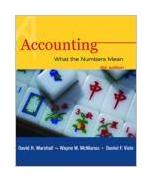|
||
• wydawnictwa polskie
• Zamów informacje o nowościach z wybranego tematu • kontakt
• Cookies na stronie |
ACCOUNTING WHAT THE NUMBERS MAEN +STUDENT STUDY RESOURCEMARSHALL D., MCMANUS W.wydawnictwo: MCGRAW-HILL , rok wydania 2003, wydanie VIcena netto: The Marshall text is written to meet the needs of non-accountants who want a basic understanding of financial statements, and who want to learn how to use accounting information in the financial decision-making process. The reader is introduced to basic concepts supporting financial statements and managerial accounting information. Students learn what financial statements do and do not communicate. A complete annual report is included in the appendix and end of chapter material based on it runs throughout the text marked with an Intel icon. New to This Edition A new attractive 4-color design, including updated icons, makes the text inviting to students tackling this material for the first time and makes graphs, figures, problems, and end-of-chapter material easier to follow and understand. Addition of Cash Flows column to horizontal method treatment of financial statements The Marshall text is now available with HomeWork Manager software. HomeWork Manager uses an intelligent algorithm to generate an infinite number of problems based on problem structures existing in the text. This allows students to practice particular types of problems repeatedly until they master key concepts. End-of-chapter material directs students out to the text website to use online materials as part of their study routine through Self-Study Quizzes and Demonstration Problems. We have added new series of mini-cases at the end of each chapter that provides the basis for a conceptual discussion of important topics from each chapter while presenting an opportunity to enhance students' writing skills. Many of these cases bring an enhanced ethical component to the text. For those desiring no coverage of journal entries, Marshall now emphasizes the user approach through a new organization which places the horizontal method before journal entries, making it easy to use the horizontal method effectively. * Special attention was given to Managerial topics in this revision to expand upon and explain more in-depth key topics, while maintaining the appropriate balance between Financial and Managerial material. Features Continued fundamental emphasis on "What the Numbers Mean" accounting "through the eyes of the user" that emphasizes a practical interpretation of the information in the financial statements and related business practices. In addition, an understanding of the information managers will find necessary to plan, control, and make decisions in carrying out their responsibilities. Continued fundamental emphasis on "What the Numbers Mean" accounting "through the eyes of the user" that emphasizes a practical interpretation of the information in the financial statements and related business practices. In addition, an understanding of the information managers will find necessary to plan, control, and make decisions in carrying out their responsibilities. Excel spreadsheet problems from the text are revised and again included on the Marshall website. Students analyze financial statements and the results on a spreadsheet, while the "What the Numbers Mean" section challenges students to apply their knowledge to real world situations. These not only increase student proficiency in Excel, students can also complete the ready-templates and e-mail them to their instructors. Expanded support package includes an Instructor's Resource CD-ROM containing the Instructor's Manual, Solutions Manual, and Computerized Testbank, as well as the testbank Word files. Learning Objectives will continue to be included with the end-of-chapter materials, which help students identify and focus on understanding the main points of the chapter. "Business in Practice" and "Business on the Internet" capsules have been revised and continue to capsules highlight various business procedures and their impact on financial statements. Study Suggestions are incorporated in each chapter as guides for students as they navigate new accounting concepts. Appendix with Intel Corporation's complete 2001 annual report piques student interest and gives hands-on experience through problem material that requires referencing this resource. Writing Problems, identified by an updated icon, require students to use and develop their written communication skills. Solid pedagogy includes icons within the end of chapter material, learning objectives, key terms and concepts. Key Terms and Concepts will continue to be defined at the end of each chapter, with page references to where the term/concept is originally introduced. A comprehensive Online Learning Center (Website) features online supplements created by the authors including Excel Problems, Study Quizzes, and in-depth Demonstration Problems, as well as Flashcards, PowerPoint Slides, Study Outlines, and a link to the Intel Corporation (the 2001 annual report is featured in the text appendix) and other real world examples used in the text. Capstone epilogue, "The Future of Accounting," continues to help bring "the big picture" of accounting into focus. This section emphasizes the profession (AICPA vision project), business in general (e-commerce and other activities), technology (the Internet, Data Warehouses, etc.), and a users/managers role in information access (database queries and end-user computing). Student Study Resource combines excellent assets for students including Solutions to Odd-Numbered Problems, Study Outlines, and PowerPoint Notes. Table of Contents
860 pages Księgarnia nie działa. Nie odpowiadamy na pytania i nie realizujemy zamówien. Do odwolania !. |


